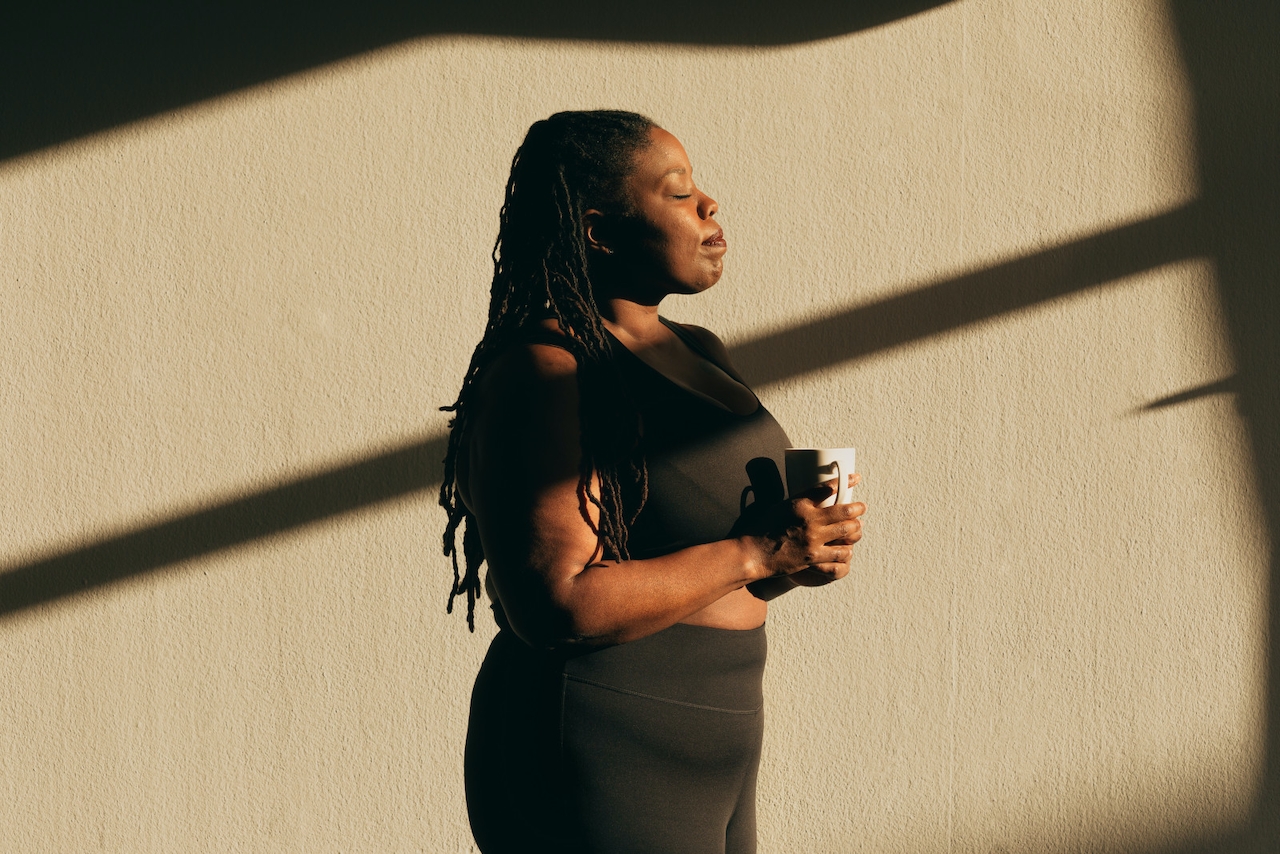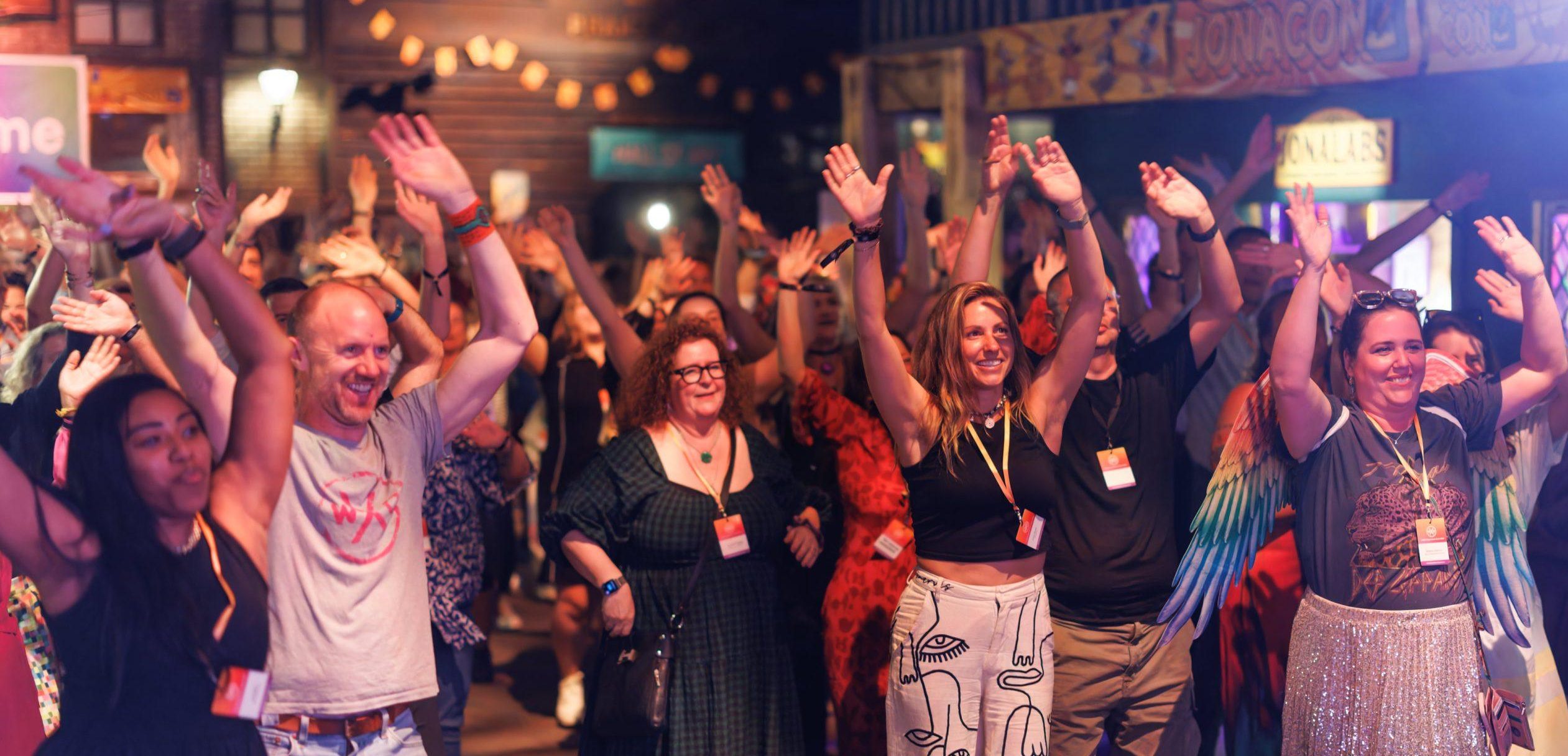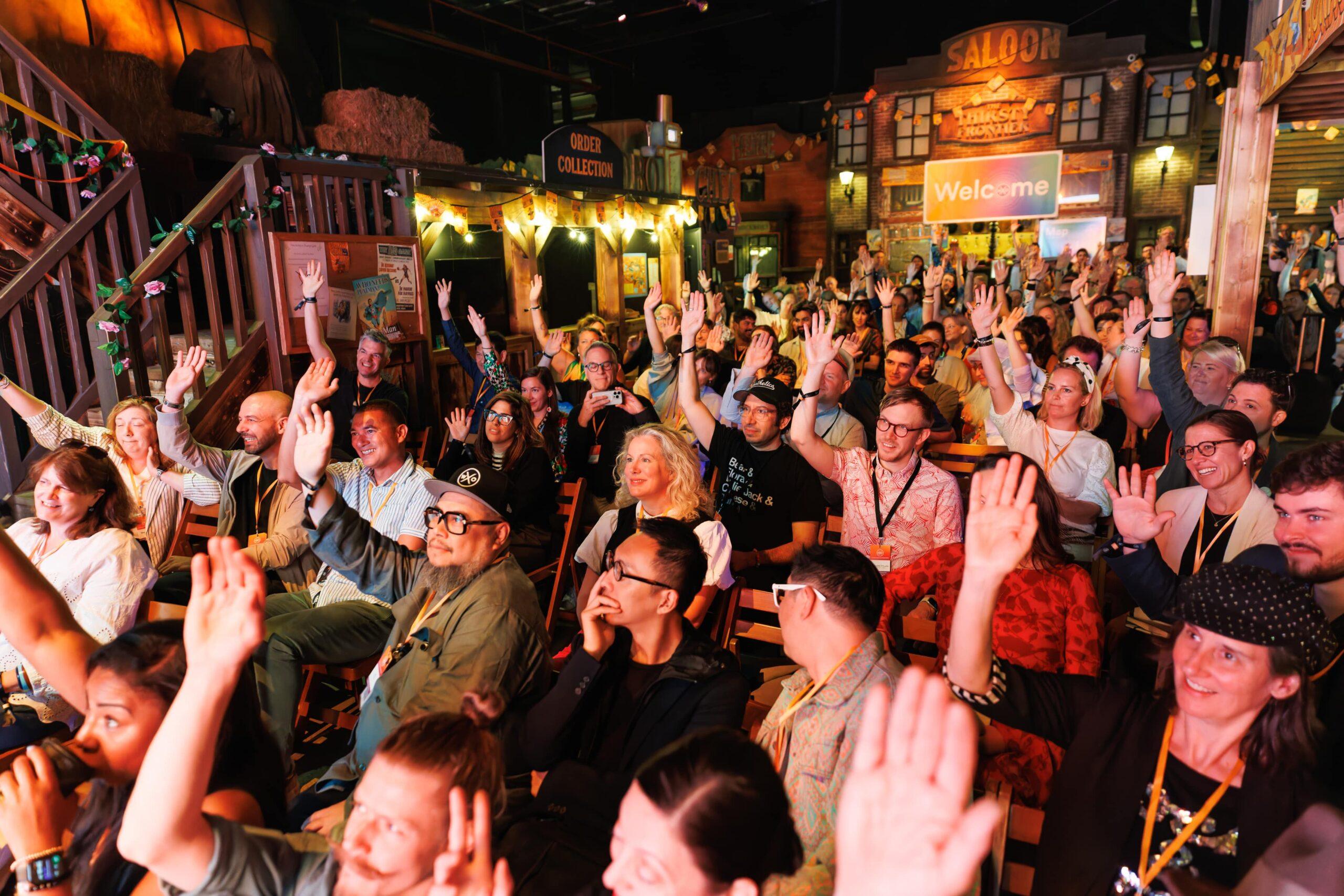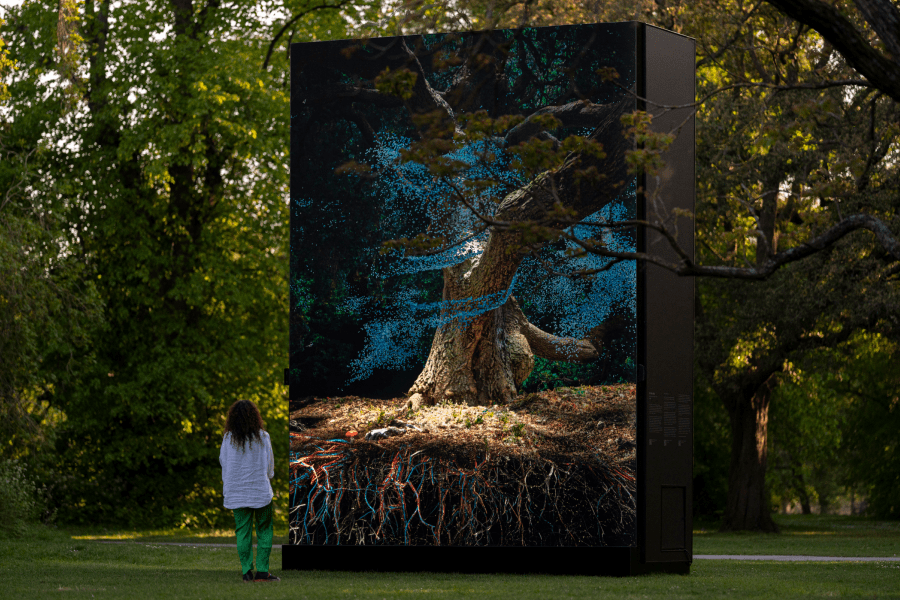“A man is the sum of his experiences.”
RD Laing, Scottish psychiatrist, 1967
Throughout history, humans have searched for a sense of meaning and purpose to give structure to their existence.
The experiences we have shape the stories we tell about ourselves, our characters, and eventually our lives.
And as society continues to look for new forms of value creation in turbulent times, businesses and organisations – and the meaningful experiences they create – will have a significant role in increasing people’s quality of life by supporting them to find their way and develop a role for themselves.
So how can we help them get there?
Albert Boswijk, author of The Economy of Meaningful Experiences, joined us for Campfires 90 & 91 to shed some light on the fundamental process of social change that is prioritising these kinds of experiences.
Delving into some old teachers in psychology of the senses and sharing some exclusive new material that will be published in 2023, he took us on a deep dive into the psychology of the senses, emotions and erfahrung (aka meaningful experiences), asking: how do we create meaning, individually, socially, and in our communities?
We think Boswijk’s insights into the meaning of experience, the 7 criteria of meaningful experiences, and the 5 steps of value creation are useful not only in the design and strategy of an experience, but also in articulating to and educating clients on why experience design should be part of both their budget and toolkit. Here’s what we learned.
Demystifying The Concept Of “Experiences”
At its core, experience is a biological process consisting of sensing, thinking, feeling, imagining, interacting, moving, and communicating.
“We do not have bodies, we are our bodies. Emotional reality and biological ground are the same and cannot, in any way, be separated or distinguished.
Life incarnate is a process of individual human experience manifesting in the body.”
Stanley Keleman
We therefore have both concrete experiences and invisible ones:
- Hormonal existence
- Muscular existence
- Social existence
Our lives are composed of a multiplicity of experiences, out of which we form ourselves. We constantly change the shape of our structure and the form of our experiences. We live in a sea of constantly altering situations, internal and external realities, new desires, new people, and new environments.
The Psychology Of The Senses
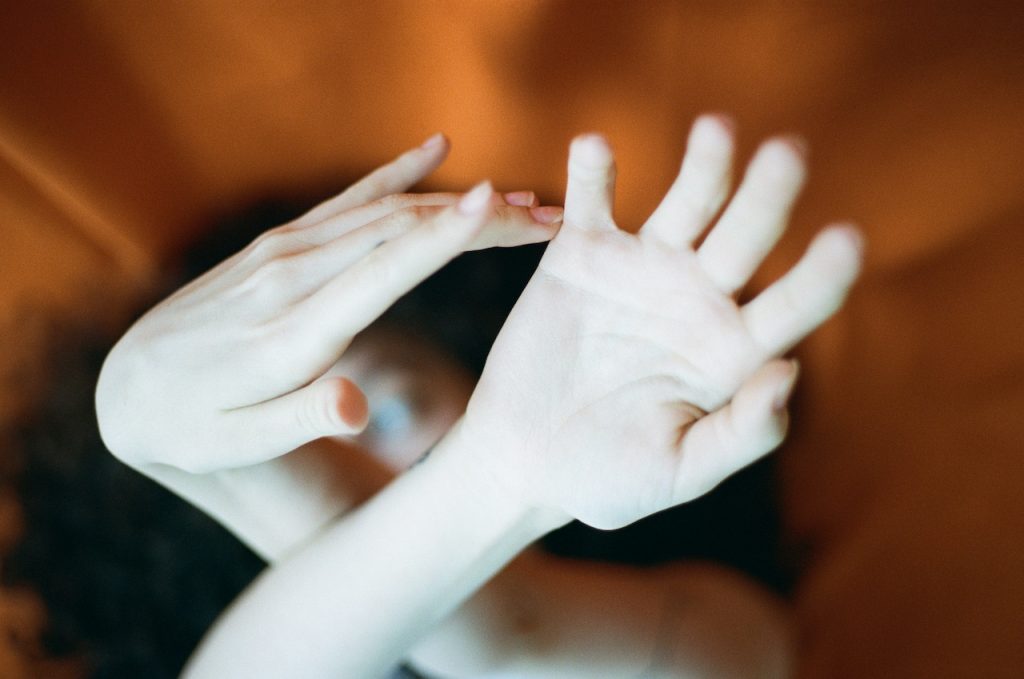
Our senses act as a bridge between our external conditions and our own bodies.
“Via our senses, we are not only in contact with the world around us, but also with our own body. Seeing, hearing, touching, smelling and tasting are the most well-known sensory activities, but kinaesthesia, sense of equilibrium and the somatic feelings that inform us about the situation in our body are at least as important.”
Egon Peter Köster
The senses provide us the possibility to become aware of the part of the physical reality that establishes our world. They are an evolutionary response to our physical environment, and usually perform their function without us being aware of it.
In the history of psychology, the intellectual aspects of our behaviour, such as language, thinking, learning and memory, have received almost all the attention. In perception psychology this has led to a dominating interest in the “higher senses” that are involved in these intellectual activities: sight and hearing.
However, our “lower senses” – bodily pleasure, wellbeing, lust, safety and security – are equally important.
The 9 Laws Of Emotions
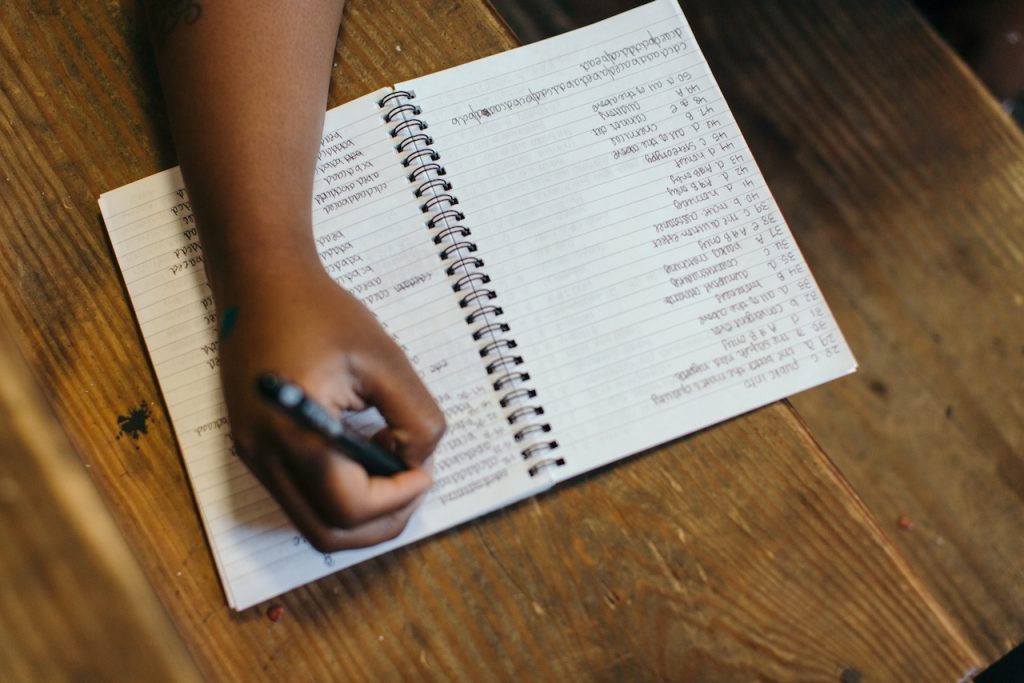
“Emotions are involuntary, unintended, not well-thought-out ways of dealing with the outside world.”
Nico Frijda
The psychologist Frijda explains that the essence of emotion is a tendency to action. Emotion is a personal, coloured perception of the self or the wider world. It is not the objective situation that causes the emotion, but the way a person assesses the situation.
From this, he defines the 9 laws of emotions:
- Emotions arise in response to the meaning an event has.
- Law of relevant interest.
- Law of apparent reality (seen as reality and intensity).
- Law of habituation and comparative sensing (pleasure and pain).
- Law of hedonistic asymmetry (impact of positive emotions neutralised).
- Law of maintaining emotional momentum (recall emotions).
- Law of closeness (absolute priority, no space for considerations).
- Law of concern of consequences (moderating impact).
- Law of lightest burden and greatest gain.
Erlebis & Erfahrung
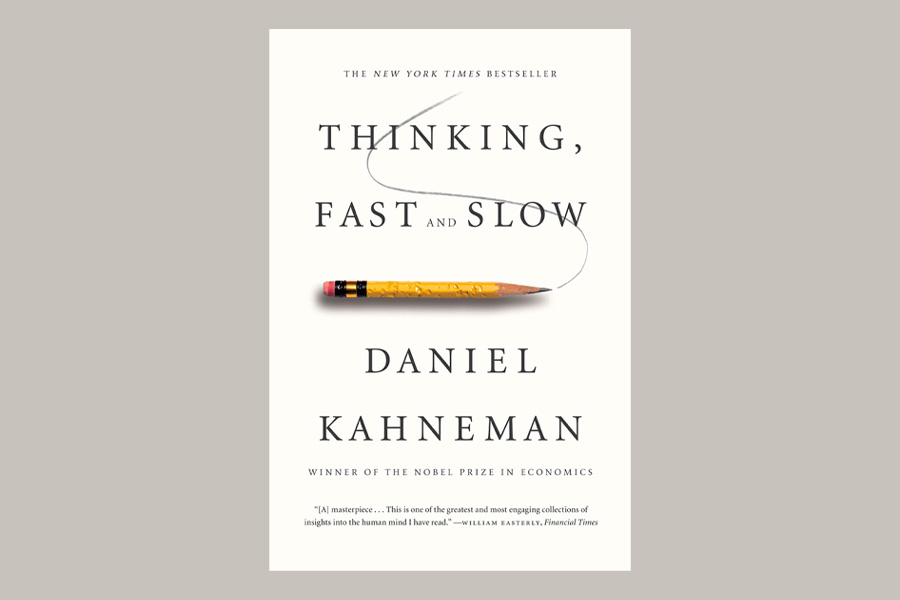
In Thinking Fast And Slow, Daniel Kahneman distinguishes between the experiencing self, which processes experiences in the now, and the remembering self, which recalls them into the present.
The experiencing self is linked to the intuitive system, and the remembering self to the rational system. When we’re buying a house, for example, we’ll first be attracted to the building itself rather than thinking about the mortgage. Our feelings aren’t always sequential, but occur in a spiral process.
When we create meaning through our senses and emotions, in relation to the outside world, it happens in two ways:
- Erlebnis: our immediate, intuitive reactions; the experiencing self in the short term.
- Erfahrung: when we wonder, become curious and reflect on an experience; the remembering self in the ongoing long term.
Erlebnis creates meaning within the context of a specific situation. Erfahrung creates meaning within the context of our lives, changing our perspective on ourselves and the world around us.
“Experience is a continuous, interactive process of doing and undergoing, of action and reflection – of cause and effect – that is meaningful to the individual in more than one different context of his life. An experience causes an individual to change his perspective on the world and/or himself.”
J.C. Snel
The Difference Between Primary And Secondary Experiences
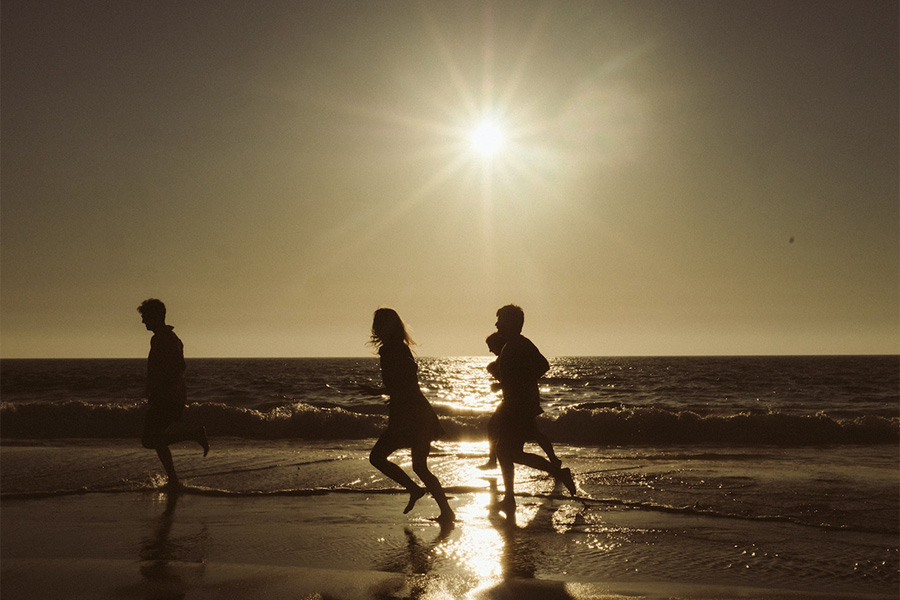
A primary experience is something immediate and personal – for example, walking barefoot on the beach, experiencing the scent of the forest after rain, or being pregnant.
A secondary experience is something that we experience from a distance, often through technology or social media – for example, watching a Boiler Room rave on YouTube.
We’ve become obsessed with secondary experiences, but primary, personal experiences determine what we value most in our lives.
The 7 Criteria Of Meaningful Experiences
Boswijk believes we must formulate a working criteria to measure the impact of an experience.
Based on his research, he has determined 7 criteria through which we create meaning in experiences. To determine if our experiences are meaningful, we can measure them against these criteria by giving them a score out of 10. If we manage to touch on all of them, we’re hitting the experience sweet spot.
- Emotion and anticipation
- Doing and undergoing
- Challenging and unavoidable
- Being part of something
- Losing sense of time
- Memorable and unique
- Wonder/wander about
(It strikes us that these criteria share many of the same characteristics as Mihalyi Csikszentmihalyi’s eight onramps to a flow state, such as losing sense of time, accomplishing something difficult, and being in the here and now.)
As an experience hits more of these criteria and becomes more meaningful, it also becomes more valuable, as this graph represents:
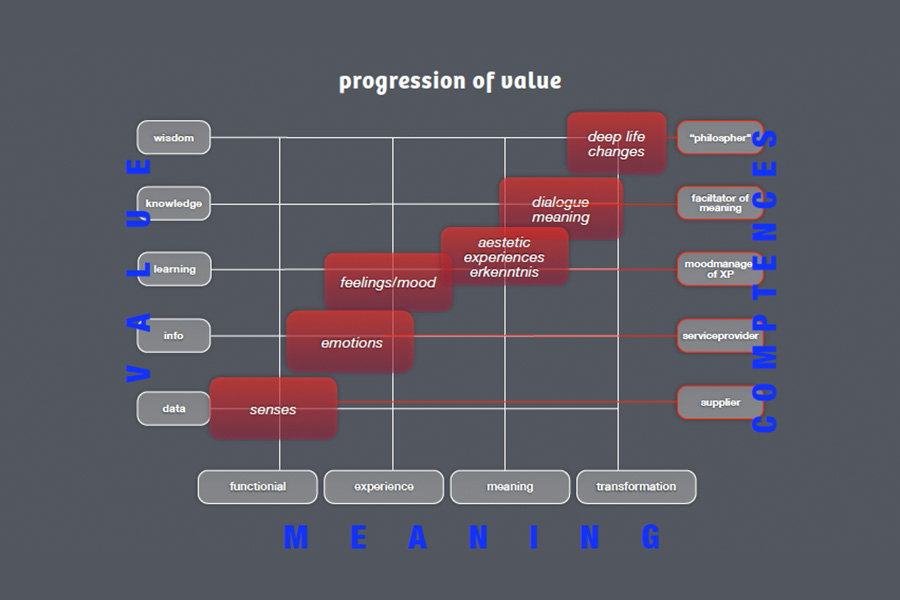
Examples of such valuable experiences include:
- The Liberation Route in Europe, which added value to each destination along the route by compiling stories from different countries and working together to assemble a shared history
- Anne Frank House
- Frida Kahlo exhibit by CocoLab.
- The aparthotel brand Zoku
The 5 Steps Of Value Creation & The Case Of Airbnb
So how do we create these meaningful, valuable experiences?
Boswijk has formulated a 5-step process to value creation that looks like this:
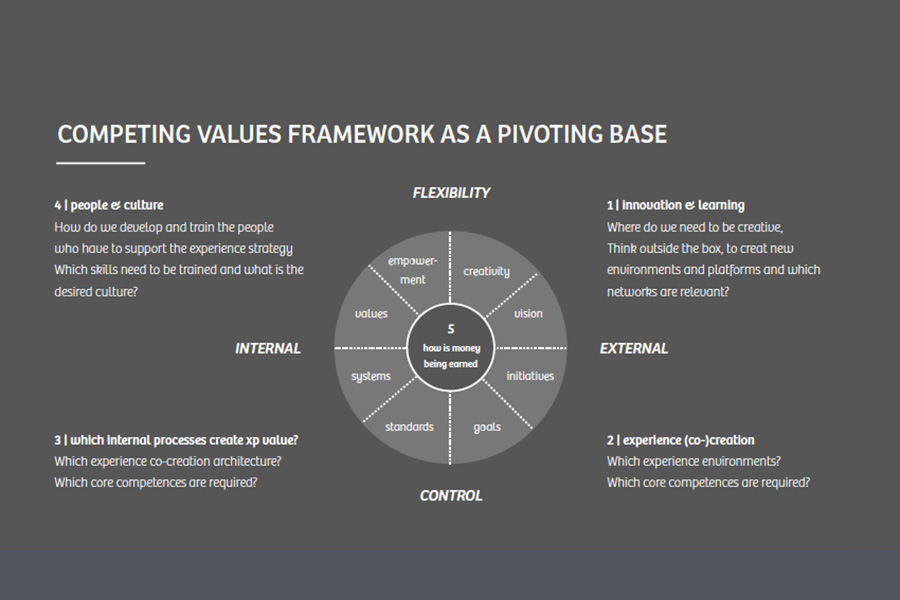
On the right-hand side, you have your strategy, ideation and wider vision, moving down to the experience value proposition.
On the left-hand side is the experience technology to execute the proposition, moving up to the people who execute it. The business model – how money is made – sits in the middle.
A simplified version might look like this:
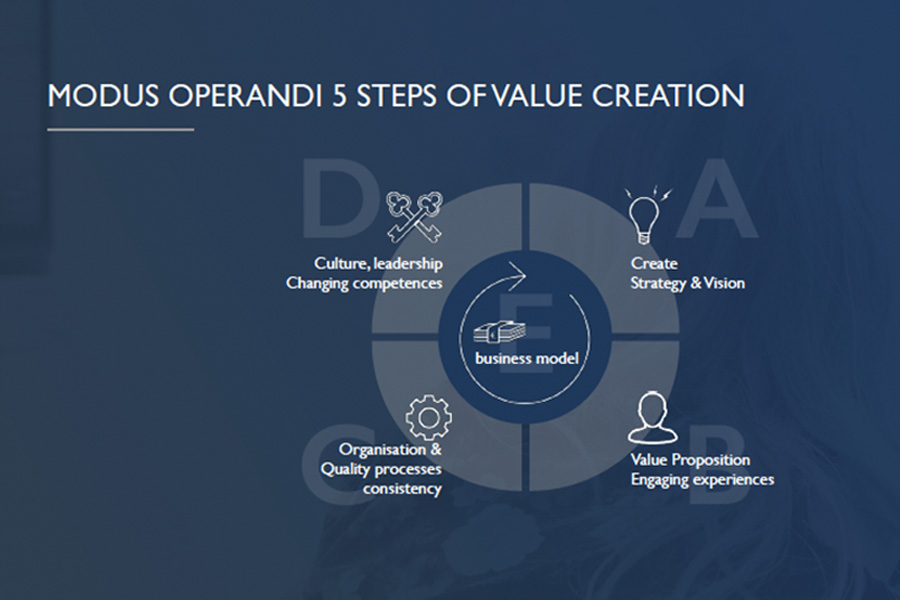
For an example of how this value creation looks in practice, Boswijk applied it to the growth of Airbnb.
- Create strategy. This step focuses on finding your purpose or essence, and clearly theming your strengths. Airbnb broke assumptions that people wouldn’t be willing to stay on an airbed in someone else’s home, building a new category based on serendipity and creativity.
- Experience value proposition. For guests, this is the opportunity to live like a local, with experience attributes of exploration, wonder, uniqueness, intimacy and trust. The guests Airbnb targets are young, urban citizens, or “cultural creatives”, with an average age of 37 and a higher than average income and education. To them, the value of using Airbnb lies in the anticipation, immersion, authenticity, belonging, dramatic action, and activation of the senses.
For hosts, it was extra money to help them pay the bills, but also the opportunity to meet other people. To share a private place means crossing an emotional threshold. - Experience technologies. For Airbnb, this included engaging in community-driven social networks, having easy-access experience design, relentless guest-centricity, seamless interfaces, data-driven dashboards and economies of scale. To succeed at placemaking, it created an omnichannel, engaging digital environment to manage anticipation(digital) and a physical environment that matched its purpose.
The experience toolbox also included having processes, scripts, protocols, touchpoints, platforms of engagement, narratives and storytelling, dramatic structure, and mood management to ensure the quality and consistency of the experience. - Culture and competencies leadership. This meant having people who understand the zeitgeist and social business. They have an experience design-driven, entrepreneurial mindset and leadership skills and are more strategic than operational.
- Business model. This refers to knowing how to create value, which Airbnb did by capturing value in a two-sided market: they earned a 13% commission on guests, but also a 6% commission on guests. They also leveraged assets like the guest data gleaned from the interface to improve the experience, resulting in local engagement and extended stays.
Traditional hotels have in turn learned from the success of Airbnb, leveraging their own offering to:
- Focus on experiences and build an experience ecosystem
- Focus on local engagement and make locals partners
- Focus on placemaking
- Pay attention to the social aspect
- Use guest data and algorithms
- Offer extended-stay propositions
“The coordinates of a new society are being formed. Individuals become creators of meaningful value, and businesses become more human.”
Albert Boswijk
The Deeper The Emotion, The Deeper The Meaning
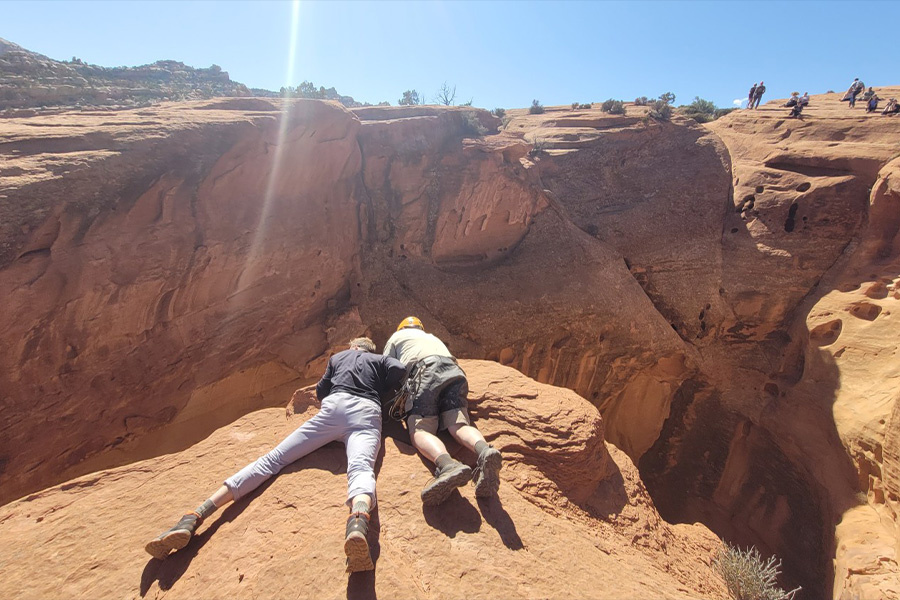
If meaning is always made by the individual and is therefore emotional and subjective, how can we use universal principles to design for meaning within our experiences?
“Meaning is up to the individual, but if you’re close to the needs and values of your participants, you come close to the same operating system. If you discover what’s important to them, you come close to them, and it can be very meaningful. Leisure, pleasure and joy are also meaningful.”
Albert Boswijk
At this year’s 7X Summit, WXO CEO James Wallman played a game where people had to think about designing experiences for “negative emotions” like distress or fear (we’ll be bringing you a future Campfire on the subject).
“The magic is that a challenging emotion gives you an opportunity for transformation – you have to go through to the other side.”
James Wallman
Most significant experiences contain both negative and positive emotions – for example, hanging over a cliff is scary – but in the retelling they become meaningful.
Perhaps thinking of emotions as positive or negative is an inaccurate way to approach them, as they really existing on a spectrum. An experience can be painful or difficult, but still create energy that needs to be released.
And as we discovered in Campfire 79: The Science Of Extraordinary Experiences, it’s not whether someone feels warm and fuzzy about an experience that determines how immersed they are in it, and in fact a negative emotion might even correlate with deeper immersion.
“If we need painful experiences for transformation / evolution, why keep labelling them ‘negative’?”
Markus Stefan
If we think about storytelling, there needs to be an obstacle to be overcome in order for us to enjoy the story – think about the basic Hero’s Journey, or the narrative of a rom-com before the protagonists get together.
“When it comes to universal appeal, the more specific and unusual the story is, the more universal the appeal.”
Jamie Ruddy
The key is the depth and the authenticity of the experience.
“I have a comedian friend who likes to say ‘there are two kinds of experiences in life: successes, and stories.’”
Brad Shelton
How Do We Describe Emotions?
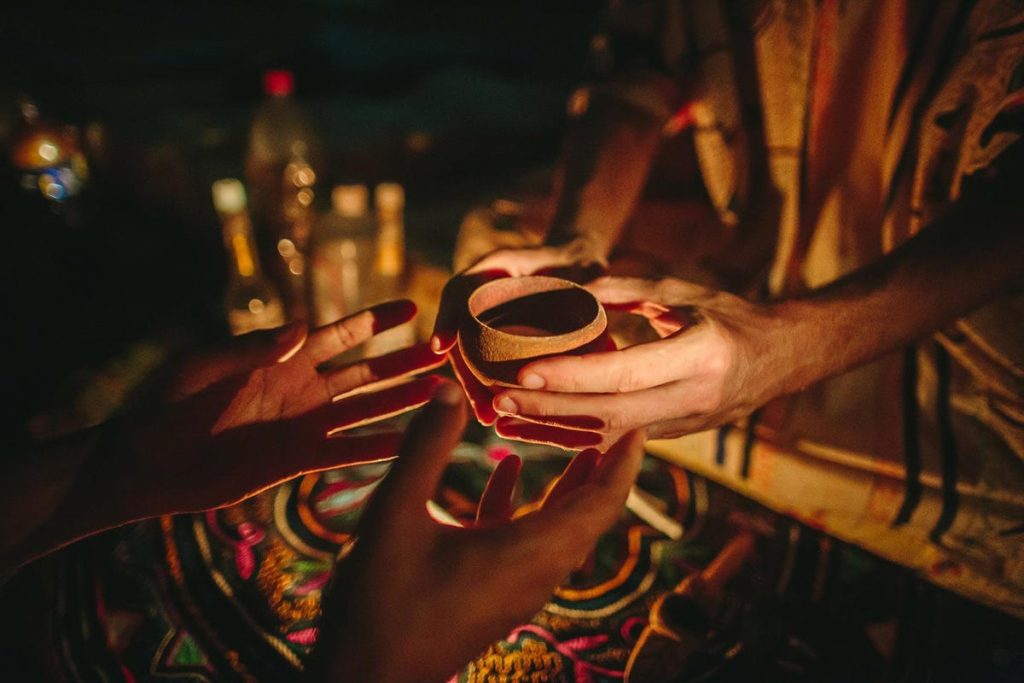
If emotions are subjective and personal, in addition to attributing negative or positive states to them, should we even use words to describe them at all?
“I’m perplexed by pure emotional states versus emotional states defined by language. Do you need to use words to describe emotions? Is the word the emotion or the attribute?”
Doug Steel
Language has its limitations, so when we get out of it, we allow for new possibilities to express our emotions – think of music, somatic therapy or taking ayahuasca. When we listen to Bruce Springsteen a bit drunk, we’re chasing the feeling itself, not the articulation of it.
“In Atlas of the Heart, Brene Brown taps into a bunch of different languages for us to have the best words in our toolbelt. As creatives, we are depicting and choosing which ones to use. The greatest part is that once we have done so, it no longer belongs to us. The people will do whatever they want with it. Wherever your intent is will never be as strong as the impact, because it doesn’t belong to you.”
Lou Murray
Creating Space For Meaning
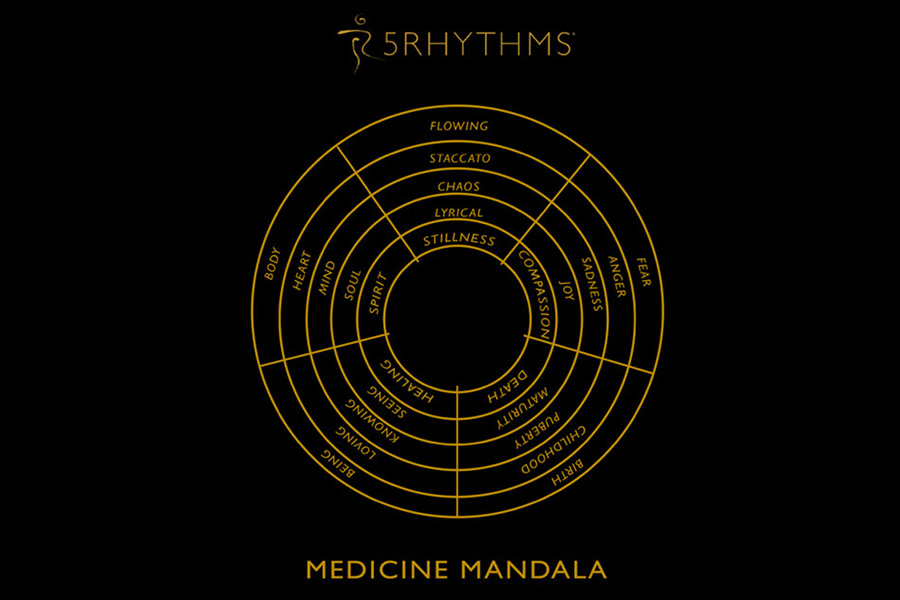
As experience designers, perhaps we’re not designing the meaning, but designing the space for it to manifest.
“It makes me think of the freestyle dance practice of Five Rhythms. It brings you up to a release and then gently brings you back down. People have their own internal experiences and bring their own stories and intentions. The music creates the space and you create the meaning.”
Aysha Teja
The term “museum fatigue” means when you’re overloaded and experiencing the same thing repeatedly. If you’re only allowed to use your sight to experience an exhibition, you get tired very early on. But if you bombard people with multiple senses, it can also create tiredness.
“We have to find the middle road between enough stimuli to embark upon emotions and a memory journey.”
Jane Nielsen
As Coco Chanel said, take one thing off before you leave the house – or in the words of AA Gill, writing isn’t about what you put in, but what you leave out.
“To expand an experience into becoming more meaningful, we need to pull material from the depths of the subconscious and the superconscious into the experience. We can’t control how people are impacted, but as creators we can reframe it.”
Audette Sophia
The WXO Take-Out
The depth of Boswijk’s research is impossible to summarise in one Campfire, but his insights give us a framework on which to begin to create meaning – and therefore value – as we move into a new society.
When we understand the emotions our audience is having or seeks to have and how they might arise, we can design space into our experiences for it to take place, making them more meaningful and valuable both to the participant and to the experience stager.
So next time you’re designing an experience, ask yourself:
- What challenging emotions might you integrate into your experience?
- How might you “create space” for meaning?
- How might you create experiences that give people a sense of serendipity or being in the present moment?
To continue the conversation, WXO Members can head to the topic on My WXO here.
To see the full line-up for the WXO Campfires Season 5, click here.
To apply to join the WXO and attend future Campfires, click here.

